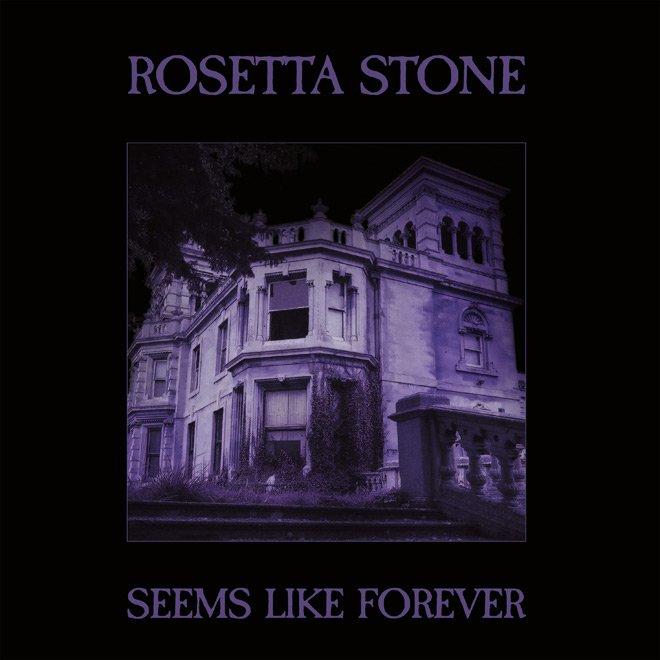After 19 long years, fans of UK -based Goth Rock band Rosetta Stone finally have a new album to sink their teeth into. Fittingly titled Seems Like Forever, it drops on Friday, May 17th through Cleopatra Records.
A long overdue return, this time around, band founder Porl King is the only musician on the whole record, providing vocals, guitar, and synth, with longtime band drum machine/synthesizer rack/intimate object “Madame Razor” also returning to provide percussion backup. Including new material and reworked Miserylab tracks, it will be available via streaming, MP3, CD and limited edition vinyl… so are fans ready?
Eleven songs in total, it opens with “Be There Tomorrow.” Featuring a sexy, retro-sounding ditty that shucks the band’s self-described Goth genre for something a little more Synth Pop/Indie Rock, King’s vocals are reminiscent of The Smiths or Depeche Mode. After that, “Children of the Poor” begins edging more toward the band’s roots with its haunting guitar tone, but the poppy drum beat and lighthearted synth still remind the listener that this is a fresh take on the legendary group.
Then, after a La Roux-like electronica breakdown, King repeatedly asks, “What the hell have we done? What the hell have we done to the children of the poor?,” A question that sets the tone for the rest of the album, as evident with the misanthropy displayed in the next track, “People.” “I’m so disappointed in you, and I’ll never forgive you,” King says, not to an individual, but to society as a whole, it seems. Furthermore, he makes great use of Madame Razor here, adding some beautifully sonorous keys over an otherwise ugly message. This track in particular would be a perfect fit for a club scene in a movie. (Hint hint, Netflix.)
In a bit of ironic juxtaposition, the next song, “Dark Times,” is the album’s most uplifting. The guitar gives the listener a feeling of hopeful optimism, like sunshine breaking through a fleeting storm cloud. With watery vocals, King admonishes not only the state as an entity, but the state of the world at large. “You can do what you like,” King sings, “‘cause I don’t care anymore.” It is here that we feel the narrator shifting his attitude from anger to acceptance; a reflection of the attitude many Millennials and Gen-X’ers have felt in their post-9/11 lives. This shift does not absolve those responsible for the chaotic world we live in, however, as evident in the next track, “Making A Bomb.” Here, King goes all-in with his finger-pointing. “They rule the world, they fool the world,” he sings with a defiant energy on the most modern-sounding track of the album, as airy synths hover over a full-bodied synergism of guitar and bass.
Moving on, then comes the album’s finest piece, “Escape.” It starts with a standard guitar riff that subtly changes to something more sinister sounding, marking a testament to how one note can change the feeling of something entirely. That, combined with King’s chorus vocals, which are distorted to the point of dissonance, makes it sounds like the backdrop for an unholy sacrament. It serves as the perfect reminder of what makes Goth Rock so unique and why it was so popular during the heyday of the ’90s.
A great start to a new album, the back-half of Seems Like Forever is a little less inspired after coming down from the high of the previous tracks. Here, listeners are presented with essentially one long 22-minute song, broken up into five pieces. While each has just enough nuance to justify the splits, a certain fatigue begins to set in, most likely due to the limitations of the drum machine and the seemingly recycled guitar riffs.
The first piece is “When You Turn Away,” which serves as an indictment of TV and the media as well as their relationship to state-sponsored propaganda. Despite the aforementioned familiar musicianship, the song is notable for containing the catchiest and most-clever lyrics. Next, “Downplay” is driven by the bass more than any other tracks on the album. Here, King deepens his voice to sing things like, “This is a new low, even for you,” and the results feel grandiose. It is a nice change of pace from King’s normal detached, yet still effective, delivery. That is followed by “What Is The Point,” where for the first 1:30, there are no vocals whatsoever; just Rosetta Stone’s trademark sounds with an added layer of fuzzy ambiance. When King’s voice does show up, it is mixed with the synth in an extremely satisfying way.
“Say What We Mean” comes next, and while it continues the trend of sounding consistent, King does add a little more edge to his voice, infusing the track with some much-needed energy. The final track, “Tomorrow For Us,” switches things up by beginning with some massively distorted piano keys, though they do not last long. It is full of ironic vitriol and feels like a conversation between two people, making for perhaps the boldest lyrical content on the entire album.
While the real-life Rosetta Stone may have needed translating, this Rosetta Stone’s message is perfectly clear: Porl King is angry, and you should be too. While the first half of the album is full of compositional variety, the latter half melds into one continuous sound. That is not necessarily a bad thing, but your mileage as a listener may vary, depending on your appetite for a diversity of experiences. Nevertheless, Rosetta Stone is back, and it couldn’t have come at a better time. That is why Cryptic Rock gives Seems Like Forever 4 out of 5 stars.
Purchase Seems Like Forever:
[amazon_link asins=’B07PP9C3ZG’ template=’ProductCarousel’ store=’crypticrock-20′ marketplace=’US’ link_id=’4e3a7097-a0f1-4b93-a5d8-702d81181c21′]







No comment